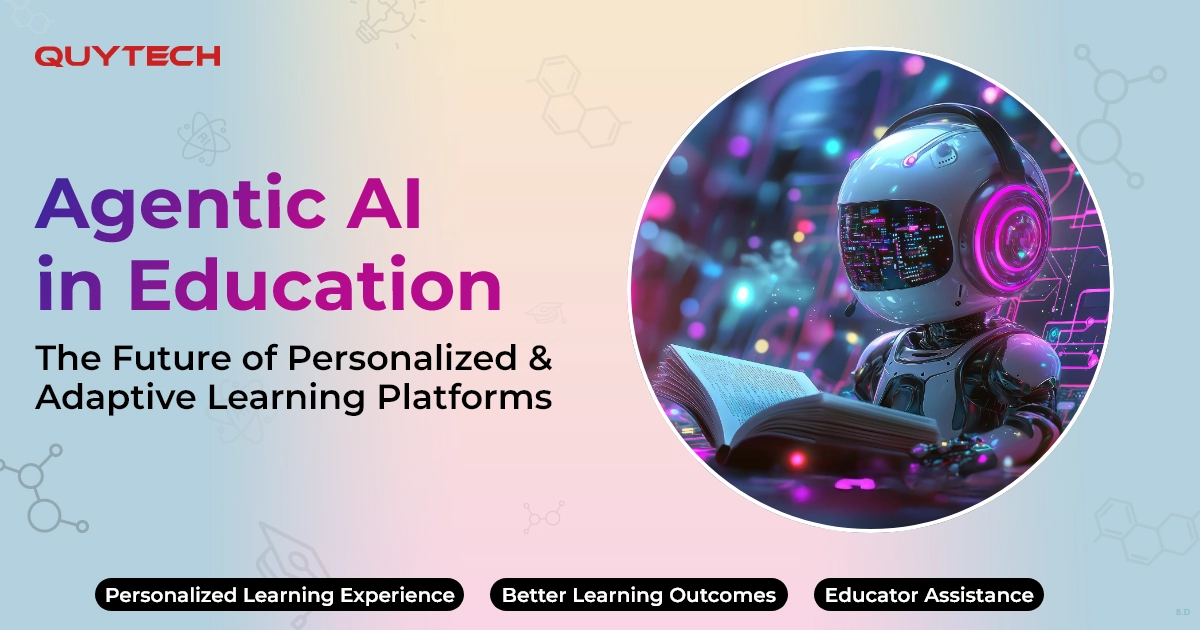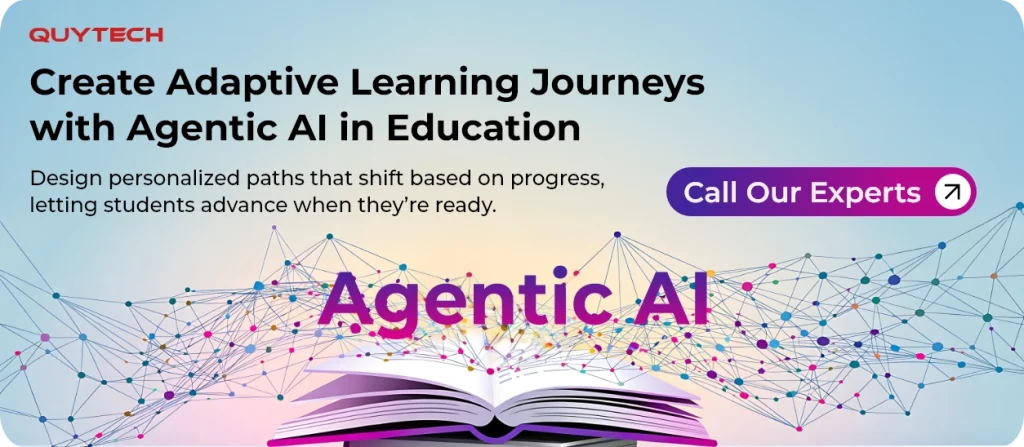Key Takeaways:
- Agentic AI in education creates personalized learning experiences for every learner.
- Agentic AI replaces traditional teaching methods. It does so by making learning adaptive, data-driven, and autonomous.
- It can learn from every interaction, take autonomous decisions, and offer data-driven insights.
- Agentic AI boosts learning outcomes. It enhances learner engagement while making individualized personalization scalable.
The education landscape has had a major transformation. The journey reflects the transitions from slates to notebooks, to smart boards, and now to AI. The transformation goal has always been to make learning truly personalized and adaptive.
And to add wings to this transformation, institutions are now leveraging agentic AI in education. Unlike the traditional education system, it does not follow a fixed teaching pattern. It understands users’ learning patterns and preferences and adapts to them. Agentic AI blends autonomy, proactive learning, and adaptability to make learning more effective and fun. But how does it do so?
If this sparks your curiosity, you’re in the right place. This blog covers everything you need to know, from features to implementation challenges of agentic AI in education.
What is Agentic AI in Education?
Implementing agentic AI in education is like having a digital teacher but with a human touch. It analyzes data, understands the learning habits of students, and makes lesson plans accordingly. In technical terms, agentic AI is an intelligent system capable of making autonomous decisions, initiating actions, and adapting to learners’ requirements.
What truly makes agentic AI in education stand out is its ability to blend lesson plans with the pace of the learner. This not only makes the learner feel valued but also contributes to enhancing their engagement in learning. Agentic AI replaces the traditional one-syllabus for all approaches. This helps students with different learning habits and paces grow without holding others back.
Traditional Teaching Software vs. Agentic AI in Education
The changes that agentic AI brings in are much more than personalization; they contribute to the effectiveness of the teaching and learning process. Here’s a comparative analysis that will help you understand how agentic AI is different from traditional teaching software:
| Aspect | Traditional Teaching Software | Agentic AI in Education |
| Personalization | In traditional teaching software, the content delivered is the same for every student. | With agentic AI in education, each learner is given personalized content and teaching plans. |
| Follow-up Approach | Conventional teaching software follows a reactive follow-up approach. | Agentic AI in education follows a proactive approach. Learners do not need to reach out for assistance; agentic AI assists when needed automatically. |
| Learning Plans | Learning plans are stagnant; they do not change as per the needs of the learner. Learners are offered content that is available. | Learning plans are personalized. If the learner has already mastered a certain syllabus, agentic AI will move to the next topic. |
| Decision Making | All the decisions regarding teaching material, lesson plans, assessments, and everything are either made by the teacher or are predecided and rigid. | The decision-making process is autonomous and carried out by agentic AI. It does not depend on teachers to make decisions. |
| Assessment Style | Assessments are also the same for every learner. They are scheduled at a standard time. | Assessments are different for every user and are taken every now and then to understand areas that are hard to learn for the user and change lesson plans accordingly. |
| Assessment Feedback Loop | After assessments, only the results are offered to students. Teaching methods remain rigid. | Post-assessments, teaching plans are changed based on the results from past assessments. Weak areas are emphasized to enhance the learning experience. |
You Might Also Like: Revolutionizing Insurance Underwriting with Agentic AI
Key Features of Agentic AI-Based Learning Systems
What truly makes agentic AI stand out in the education sector is its features. These features make agentic AI capable of making a difference to the existing teaching methods. Let’s dive deeper and understand the key features of agentic AI in education:
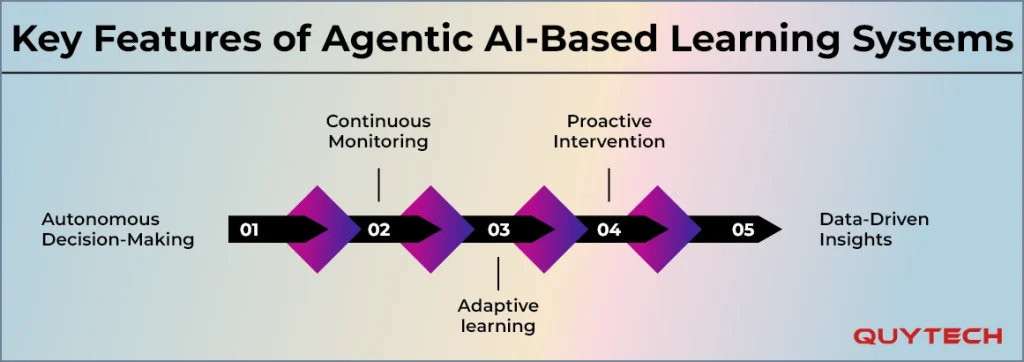
Autonomous Decision-Making
Agentic AI is capable of making decisions to carry out tasks without depending on human intervention. It can grasp the context of a situation, create action plans, and execute them without needing approval from operators.
Continuous Monitoring
Unlike traditional teaching, agentic AI does not just assign tasks; it continuously monitors learners’ learning experience. Agentic AI in education supervises every stage of a lesson plan. This helps it in understanding how long user takes to learn, what methods help them the most, how they perform assessments, etc.
Adaptive Learning
As mentioned already, agentic AI keeps track of the overall performance of learners. Assessing the performance journey allows agentic AI to understand gaps in the lesson plan, effective, and ineffective areas. This helps it to change the lesson plans according to the needs of the user.
Proactive Intervention
Agentic AI follows a proactive approach. Unlike traditional teaching methods, agentic AI does not wait for the user to reach out. Instead, it proactively approaches the learner in areas where they hesitate or feel stuck.
Data-Driven Insights
Unlike traditional teaching methods, agentic AI is not limited to just report card-based insights. Instead, it analyzes performance to depict learning patterns, engagement levels, conceptual understanding and gaps, and much more. It provides insights based on each aspect instead of just assessments.
Read More: How to Build an Agentic SaaS Platform
How Agentic AI Works in Personalized E-Learning Platforms
To understand how agentic AI brings transformation in the education sector, it is necessary to understand how agentic AI functions. So, here’s a detailed breakdown of the working mechanism of agentic AI in education:
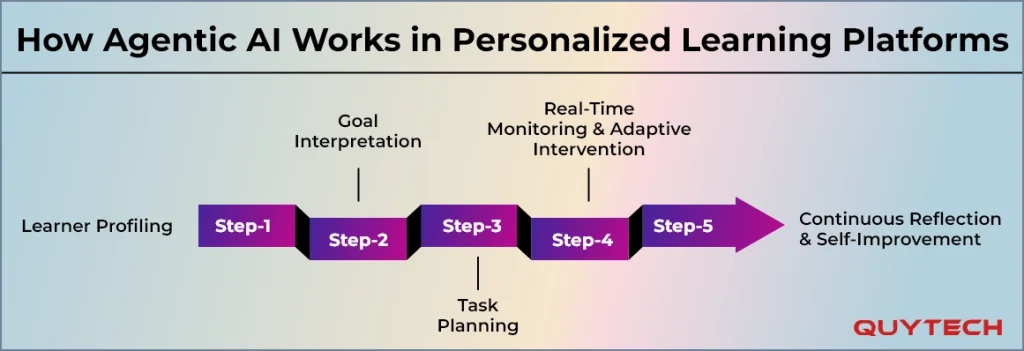
Step 1: Learner Profiling
Firstly, the platform registers the user with their credentials. After registration, a profile gets created, which reflects basic information about the learner, like name, email, etc. Along with this data, other relevant information is also considered. These include learners’ prior knowledge, how long it takes them to learn concepts, the methods they prefer, etc.
Step 2: Goal Interpretation
Once the basic data is collected, the next step is to understand the goals of the learner. This includes knowing the objectives the user has in mind. These goals will help agentic AI set learning objectives, milestones, and make decisions on the action plan. With this, a personalized learning plan is created for the learner.
Step 3: Task Planning
After understanding the goals that the user plans to achieve, agentic AI begins creating lesson plans. It does so by choosing study material according to the preferences of the user. These may include interactive learning sessions, quizzes, assessments, and relevant content from different sources.
Step 4: Real-Time Monitoring and Adaptive Intervention
The role of agentic AI in education does not end with just providing lesson plans. Once it gives the learning schedule, it begins monitoring the learning experience of the user in real-time. This allows it to understand which type of learning method, assessment, and content is actually helping the learner.
Step 5: Continuous Reflection and Self-Improvement
After understanding what actually works for the learner, agentic AI begins reflecting on its past outputs. Here, it assesses the gaps in what should be offered and what is offered. Agentic AI plans on how to fill the gap and then executes the plan. This cycle continues, and agentic AI keeps improving, eventually giving users personalized learning plans.
You Might Also Like: Agentic AI For Financial Advisors: Use Cases, Benefits, and More
Benefits of Implementing Agentic AI in Education
The implementation of agentic AI in education has brought immense benefits for not just the learners but also for the educators. It provides a personalized learning experience for learners. But the benefits are not limited to just that. Here’s a dedicated section explaining the benefits of implementing agentic AI in education:
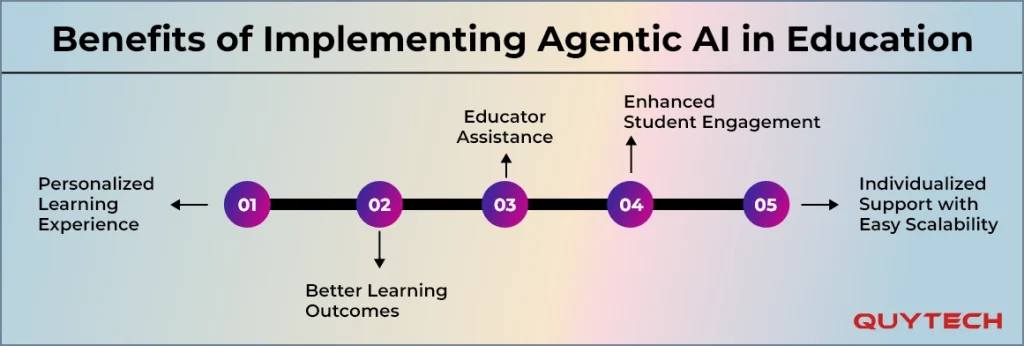
Personalized Learning Experience
Implementing agentic AI in education allows institutions to provide a personalized learning experience for each and every student. It regularly assesses the progress of learners and customizes lesson plans accordingly. This ensures the effectiveness of customized lesson plans.
Better Learning Outcomes
Agentic AI helps students learn at their own pace. It does so by incorporating continuous progress tracking, adaptive teaching, and smart assessment practices. This not only helps students grasp concepts but also master them, naturally enhancing their learning outcomes.
Educator Assistance
Agentic benefits not only students but also educators. It automates repetitive and time-consuming administrative and assessment grading tasks. This allows educators more time to focus on student learning and support.
Enhanced Student Engagement
Unlike traditional teaching methods, agentic AI does not follow rigid learning patterns. It offers different and interesting learning models to students and analyzes their output. With this, agentic AI offers exercises, assessments, and lesson plans based on learners’ preferences. This naturally contributes to enhancing student engagement.
Individualized Support with Easy Scalability
In traditional teaching, scaling individualized learning is challenging as it would require more educators. But with agentic AI, scaling individualized support becomes very easy. Agentic AI platforms can easily provide personalized learning support without compromising individual experience.
Challenges and Best Practices for Agentic AI Implementation in Education
While agentic AI in education brings a lot of benefits, its implementation process comes with its fair share of challenges as well. These challenges include resistance to change, data privacy concerns, and overdependence on technology. But like any other problem, these challenges can be solved as well. But how? Here’s a detailed dive into the challenges and best practices for agentic AI implementation in education:
Resistance to Change
A very common challenge to adopting technological advancements is the resistance to change. In the case of implementing agentic AI in education, the challenge is often the resistance of educators towards a technology shift. This may arise when teachers are comfortable with their traditional teaching methods.
Best Practices
Educational institutions can overcome the resistance challenges by introducing teacher training programs. This will help them shift from traditional to agentic AI teaching practices, along with developing their own skillset.
Overdependence on Technology
Many times, when implementing agentic AI in educational institutions, one may see an overdependence of students on technology. This overdependence can negatively impact the learning habits of students.
Best Practices
Institutions implementing agentic AI in education should ensure that they maintain an optimal balance when utilizing technology. Boundaries should be set for educators as well.
Data Privacy Challenges
As it’s known already, agentic AI in education utilizes user data to provide personalization. This data can be subjected to cyber threats, which may result in institutions hesitating to adopt agentic AI.
Best Practices
To overcome data privacy challenges, institutions can opt for agentic AI solutions that comply with legal requirements. Along with this, adopting data encryption practices also contributes to enhanced data security.
Similar Read: Using AI Agents in Code Security: Benefits, Challenges, Types, and More
Real-World Applications of Agentic AI in Education
Now that you are familiar with most of the agentic AI in education, let’s walk you through some real-world examples of the same:
Carnegie Mellon’s Cognitive Tutor
Carnegie Mellon’s cognitive tutor is an AI-based education platform. It helps students with maths lessons. The platform analyzes problem-solving duration, methods, etc., and adapts to their learning speed.
Duolingo
Duolingo is an agentic AI-based problem that helps its users with language programs. It gamifies lessons to retain users and enhance their engagement while working on language learning. Along with this, it customizes lesson plans to suit users’ learning methods.
Gradescope
Gradescope is a platform that enhances the learning experience of students by using agentic AI in higher education. It creates customized study materials, assesses performance, tracks progress, and adapts to users’ learning needs.
Partner with Quytech to Build Agentic AI Learning Platforms
When it comes to implementing agentic AI in education, the expertise in building reliable solutions matters the most. And that’s where Quytech stands out. With an expertise in building agentic AI solutions for varied industries, Quytech has the experience and resources to bring your vision to an accomplished mission.
Our successful projects, like AI-powered Literacy Pro, targeting the education sector, reflect our ability to deliver industry-specific solutions. Quytech’s dedicated developers ensure close communication from the discovery to the deployment processes. With special emphasis on customization and scalability, we build solutions that go and grow with your needs.
Conclusion
As the winds of transformation have already reached the education field, learning programs are shifting their focus from a batch to an individual. With agentic AI being the driving force, the education sector is witnessing the power of autonomous decision-making, real-time monitoring, adaptive learning, and much more.
Agentic AI in education brings in a much-needed transition. It is turning the old one-size-fits-all approach to learning methods into a personalized learning program. With better outcomes, greater support for educators, higher engagement, and scalability, agentic AI is enabling institutions to embrace the future of learning.
FAQs
No, agentic AI in education does not replace teachers. Instead, it assists them by automating administrative tasks, allowing them time to focus on student learning.
Yes, agentic AI can work with existing LMS or digital classrooms. This can be done by following API-based integration practices.
Yes, agentic AI emphasizes customized learning patterns. This allows it to adjust to the needs of students with special abilities.
Yes, agentic AI is capable of analyzing behavioral patterns like disengagement, hesitation, and boredom. It handles these patterns by offering interactive and creative content, which keeps students engaged.
